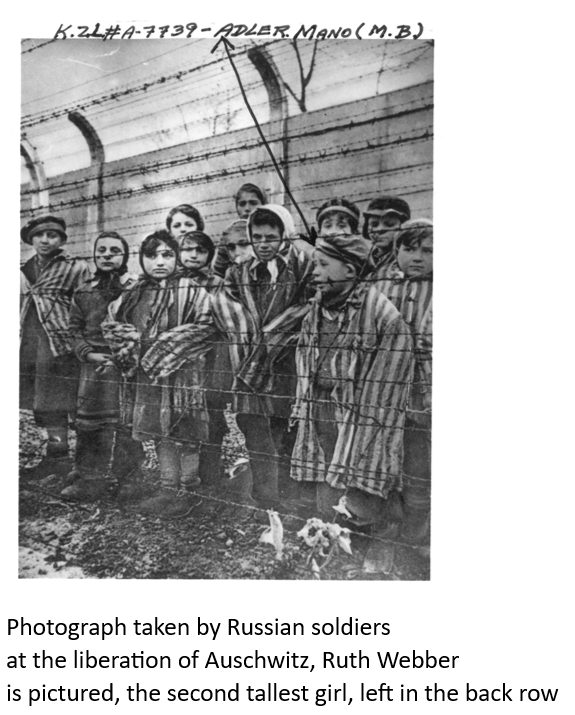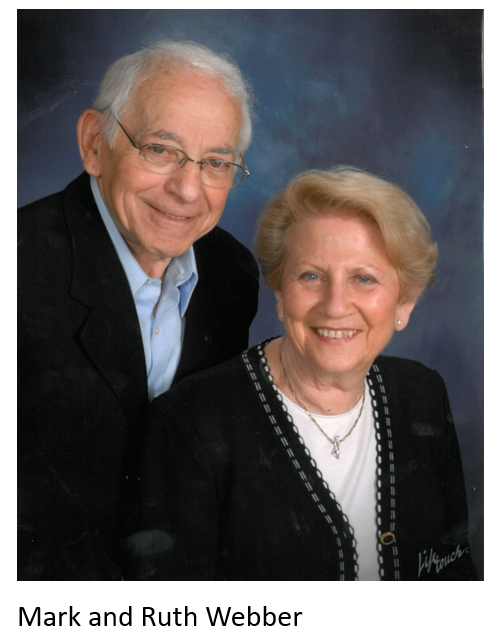Ruth Webber
"My grandson interviewed me extensively a few years ago. Within his conclusion is my message:"...I think about all of the family members I would have if the Holocaust had not happened...My family is an example of how the survivors have built from the ashes to create new lives....This brings new meaning to the phrase "Am Yisroel Chai".""
Name at birth
Ruth Muschkies
Date of birth
06/28/1935
Where were you born?
Where did you grow up?
Ostrowiec, Poland
Name of father, occupation
Shmuel,
Professional photographer
Maiden name of mother, occupation
Malka Angenici
Immediate family (names, birth order)
My paternal grandmother lived with us, my parents, one older sister Helen and me
How many in entire extended family?
There were a total of 35 people in the extended family. My mother had one sister and two brothers. My father had two sisters and a brother.
Who survived the Holocaust?
My mother, sister and I survived. My sister is a talented musician, and was taken in by a Christian family. She had to adopt their religious and cultural norms. None of our extended family survived.
I was only about 4 years old when the war started. When the Germans invaded our city, everything changed. People were scared, and there were incidents that made everyone act differently. My grandfather was caught in the street and his beard was shaved off. My aunt was raped, and after that, was never the same again. When we were sent to the ghetto, people could no longer do their jobs; my father could not own or operate independently. He was forced to work for the Nazis.
We were transported from the ghetto to a work camp at Bodzechow. Children were not ‘counted’ as people. I was forced to hide, and I kept my ears open to hear rumors of new German trucks coming in to take us to other work camps, or in some instances to Treblinka. We would sneak out and spend the night out in the forest until it was safe to return to the work camp. One time, I refused to sneak out with the other mothers and children. I had just decided that I would not go. Well, the people that did sneak out were found by a patrol, and we never saw them again.
Eventually I ended up in Auschwitz. After a time, they took all of the children away from their families, and put them all together in one area. In these Kinderblocks, we were treated a little differently. For instance, there were no selections, instead were asked to volunteer, and bribed with promises of chocolate and gifts. Children who volunteered were taken to Mengele's hospital. Not many of them returned, and the ones who did were never the same. They would just sit and stare off into space. I did not volunteer. My mother had been my lifeline, always telling me "this can't last long". My mother and father were gone, and I was just trying to get through my days. I stopped caring if I lived or died.
Whenever there was a roll call for selections, it was incredibly well organized. People would attempt to run into other buildings to hide and possibly save themselves for one more day. They were immediately shot. When we weren't being watched, other children and I would look for places to hide, just in case we needed to.
In one of the barracks, corpses were kept, and we tried to create a hiding place there among the corpses. We knew that we were in a death camp, because we saw carloads of people coming in, but no one would come out, and the next thing you saw was the chimney smoke. And you didn’t even have to go outside to know when it was happening because you could smell, and even taste the smoke from the crematoriums.
My mother was in Auschwitz too, and we were actually together for a few months. When I became ill, she would bring me a piece of bread when she could, and try to comfort me and make me feel secure. She came to me one day to tell me that she was being transported to another camp. I tried to be grown up and told her “What good are you to me anyway? You can’t help me from going up the smoke stack?” Now I realize that these words were probably very cruel.
It wasn't until after she was transported that the children were taken to another camp adjacent to Auschwitz. These were Mengele's blocks. I saw him, but would not recognize him, because I never looked above his boots. I guess I thought, in a child's way, that if I did not look at him, maybe he would not see me.
I saw my father before he died, when I was in the children’s block at Auschwitz. Someone helped arrange for us to see each other, through the electric fence. I feel terrible that I cannot remember too much of that time, even what language we spoke to each other. I remember I was so rude to him; I was angry that he didn't protect us. He threw some cigarettes over the fence for me to trade for food or whatever else I could get. We saw each other maybe two or three times, and there were rumors of the liquidation of the camp.
There was also talk of a march away from the camp, which was to be the last chance to leave, and hopefully escape extermination. He told me that I had to do everything that I could to be in this group of prisoners that left before the liquidation began. He advised me to try to appear older than my actual age, because the young and sick were to be left behind to be executed. My father was able to get on that transport, but I was left behind. He survived the transport and marched out of Auschwitz but died in Mauthausen two weeks before the war ended. .
I was liberated by the Russians in 1945, I think January 27th. The Germans had already fled Auschwitz about ten days before that to save themselves. At one point, some Germans returned to the camp and randomly shot some of the remaining inmates. I managed to survive.
Name of Ghetto(s)
Name of Concentration / Labor Camp(s)
Where were you in hiding?
I was placed, like my older sister, with a Christian family. My father paid a lot of money to this family. I was hidden in a closet for several days, but the family became too worried. After a short time, they decided that it was too dangerous to hide me, and they sent me back to my parents.
Where did you go after being liberated?
An orphanage was set up for us in Cracow, where they tried to feed us and get us back to health. My mother was liberated after the war was over, and like most people returned to our hometown, hoping to find friends and family members. She found me, only after other people from the town told her that they had seen my name on a list of survivors posted at the Cracow train station. She brought my sister, who had survived with the Christian family, to Cracow to find me. It would have been to difficult for her to take care of me and my sister, so she placed us in a children’s home in Bielsko. After that, travelled illegally through Czechoslovakia and into Germany where I lived for two years.
Where did you settle?
Toronto, In 1948, I immigrated to Canada, where some of our cousins were living
Occupation after the war
Student, then Bookeeper
When and where were you married?
1956 in Toronto
Spouse
Mark Webber,
Metals broker
Children
Shelley, pediatric physical therapist in Ann Arbor Elaine, pediatric nurse in Huntington Woods Susan, works in software instruction design in Washington D.C.
Grandchildren
Five: two girls and three boys
What do you think helped you to survive?
I credit my survival primarily to my mother’s willingness to protect me, no matter the cost to herself. Her steadfast determination, along with a lot of luck and faith, made our survival a reality.
What message would you like to leave for future generations?
My grandson interviewed me extensively a few years ago. Within his conclusion is my message:"...I think about all of the family members I would have if the Holocaust had not happened...My family is an example of how the survivors have built from the ashes to create new lives....This brings new meaning to the phrase "Am Yisroel Chai"."
Interviewer:
Charles Silow
Interview date:
04/06/2011
To learn more about this survivor, please visit:
The Zekelman Holocaust Center Oral History Collection
https://www.holocaustcenter.org/visit/library-archive/oral-history-department/webber-ruth-muschkies/
https://www.holocaustcenter.org/visit/library-archive/oral-history-department/webber-ruth-muschkies/
The Voice/Vision Holocaust Survivor Oral History Archive, University of Michigan
http://holocaust.umd.umich.edu/webber/
http://holocaust.umd.umich.edu/webber/
Experiences
Survivor's map


